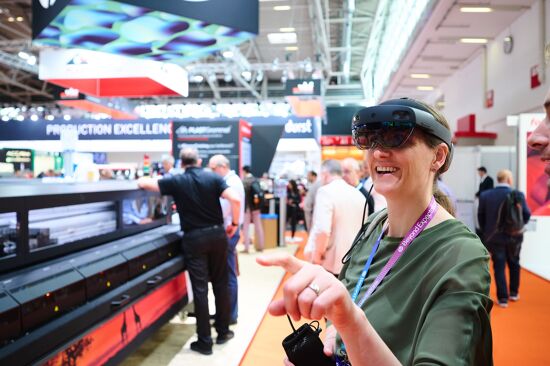Climate change realities from Epson

Epson, the Japanese developer and manufacturer of wide format digital printers and other electronic kit, has recently published the results of a global survey. Laurel Brunner shares the key findings from this survey.
Epson’s work captures the views and perceptions of 15,264 consumers in Asia, Europe, North and South America. According to responses, there is an alarming gap between reality and perception when it comes to the climate crisis. 46% of people believe that in their lifetimes climate crisis will be avoided. This is hopeful, if niaive, but dangerous. It suggests that climate change mitigation is someone else’s problem to solve and that individuals need to do nothing. Only 32% of respondents believe public awareness of climate change is rising; 28% that technology will solve the problem; and 19% think that renewable energy sources will do so. The report states that “Globally, 5% of respondents do not believe that there is a climate emergency at all — with the US (11%), Germany (7%) and the UK (6%) topping the list of climate deniers.”
These are unrealistic and complacent positions, given the urgency of the problem and suggest that people are rather too optimistic about the threat global warming poses. This is despite major climate related catastrophes such as flooding and wildfires raging out of control on multiple continents. Reluctance to face facts might be because of the inconvenient truth of climate change mitigation. It requires a fundamental change in individual, corporate and household behaviours. And no one likes change or the work required to implement it.
At least some corporations, fund managers, investment houses et al are taking active and deliberate steps to clean up their acts. From polishing the credentials of consumer brands, through to maximising shareholder values and return, the world of business is taking the climate risk seriously. And the graphics industry is supportive of their communications efforts. In addition to more sustainable production services, the printing industry has responded with offers of carbon balanced products, improved colour and data management, and greater automation to minimise emissions and environmental footprints.
But, in the West especially, individuals have made relatively limited changes to their behaviour. Epson’s survey confirms that laziness. Too much food is consumed, and too much is wasted. Supply chains are complex and extensive. Too few of us think twice about the necessity or not of car journeys, or consider ganging them (errands once a week for instance), using public transport, cycling or walking. We are unwilling to forego the convenience of modern life whether its traipsing to a recycling point or hanging laundry to air dry. We like using paper plates because it saves on the washing up and we love shopping for new stuff whether we need it or not. We prefer not to hear arguments against sending used clothing to another country. We want to believe that charity shops are a good-conscience outlet for excess purchasing and consumer short-termism.
Climate change and sustainability obviously impact all of us, from sourcing raw materials through to end-of-life management for all goods. Environmental messaging is not a soundless drum, but clearly it needs to be hit harder and sound louder. The messaging has to be much more visceral to convince people that personal convenience matters less than action.
Of the awareness problem Epson intends to do something positive. Yasunori Ogawa, global president of Epson, said: “Epson’s goal is to bring this awareness and the technologies needed — by our company, other businesses and consumers — to make transformational change. Sustainability is central to our business plan and backed by significant resources — because while we know there is a long way to go, we believe we can build a better future.” Let’s hope some of this commitment and resource finds its way into Epson’s printing industry interests.
This article was produced by the Verdigris Project, an industry initiative intended to raise awareness of print’s positive environmental impact. This weekly commentary helps printing companies keep up to date with environmental standards, and how environmentally friendly business management can help improve their bottom lines. Verdigris is supported by the following companies: Agfa Graphics, EFI, Fespa, Fujifilm, HP, Kodak, Miraclon, RicohSplash PR, Unity Publishing and Xeikon.
Topics
Interested in joining our community?
Enquire today about joining your local FESPA Association or FESPA Direct
Recent news

Streamlining personalisation with tech: Insights from the SmartHub Conference 2025 speakers
Personalisation Experience 2025 (6 – 9 May 2025, Messe Berlin, Germany) is running its inaugural SmartHub Conference from 6 – 8 May 2025.

Special Effects in DTF: How Neon Inks Are Making Apparel Pop
Neon fluorescent inks are the latest innovation in DTF printing, offering vibrant, eye-catching effects under both daylight and UV light, giving apparel decorators a competitive edge. Testing shows good wash durability, though market perception of added value is still developing. With increasing adoption and ongoing technological advancements, neon represents a significant upgrade for creative customisation.

Unlocking Growth Opportunities in the Printed Personalised Apparel Industry
The printed personalised apparel industry is booming, projected to reach $10.1 billion by 2030. Driven by consumer desire for self-expression and branding needs, technological advancements like DTG/DTF and e-commerce integration are key. Sustainability, eco-friendly materials, and on-demand printing are crucial growth drivers. Businesses leveraging these trends, including AI and social media, have significant commercial potential.

How to grow your business with white ink applications
Opaque white ink is revolutionising signage, vehicle graphics, wallcoverings, short-run and wood packaging, and window blinds by enhancing vibrancy and clarity. This enables printers to offer high-demand, standout products, boosting profit margins. HP Latex white ink applications and their large format printing solutions will be showcased at FESPA 2025 in Berlin.